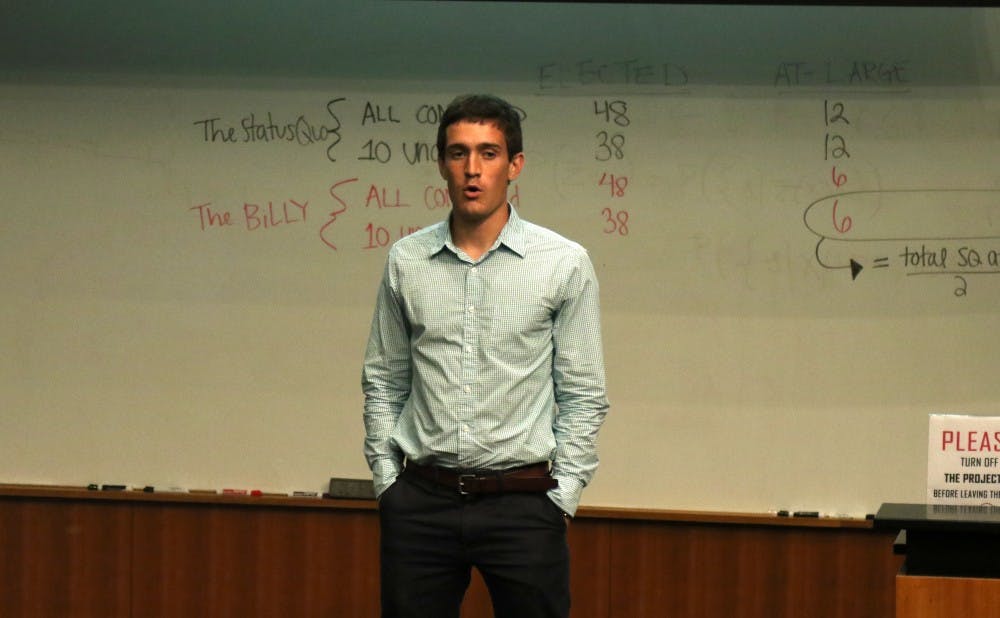At its Wednesday meeting, the Duke Student Government Senate failed to pass another attempt at restructuring and decreasing its size.
The Senate voted on two proposals regarding at-large positions and vacancies in the Senate. The first proposal—from senior Tanner Lockhead, vice president for Durham and regional affairs—sought to address the growing inefficiencies of a large senate. He also noted that it was problematic allowing the selection committee, comprised of executive board members, to appoint nearly half of all voting senate seats. The proposed by-law change—which needed a two thirds majority to be approved— would have reduced the number of maximum senate seats from 60 to 54 senators this year. The measure failed in a vote of 15 “yes” and 8 “no."
Questions were raised over maintaining the diversity of the Senate if the size were to be reduced. Some senators also said that having the current 25-member senate vote on a bill affecting at-large seats, which will be appointed next week, was unfair.
“I think that the at-large process is the best way to right that wrong and diversify and reach out to groups that don't run in elections and don't have their voice heard, so that they could be on the floor and to speak their piece when we are deciding on the legislation that we have the voices of the entire student body,” said sophomore Kristina Smith, senator for services. “Most people agree that the way people get elected is through the people that they know. Often times, that is aided by your affiliation, whether that is Greek life, SLG or what clubs you're in.’
Smith spoke against the legislation on the basis that it would reduce the diversity in the Senate, noting that elected senators are less diverse than at-large senators. For example, by the end of last year, 69 percent of elected DSG members were Greek, whereas a demographics survey of all senators—elected and at-large—showed only a 56 percent Greek majority.
Sophomore Jackson Dellinger, senator for Durham and regional affairs, also motioned to postpone the vote, which was denied, and went on record to question the legitimacy of voting to reduce the size of the Senate without the entire Senate being present.
Lockhead noted that similar legislation was proposed seven times in the past with the full body of the Senate but also failed to pass. Though this proposal was voted on without the upcoming at-large senators, the proposed by-law change was still denied.
The Senate also voted on an amendment that would affect how at-large senators would be chosen. The original by-law change, proposed by Senate President Pro-Tempore John Turanchik, a senior, addressed changing the selection committee to include the president and chief of staff. This change was introduced last year. However, it was passed when Senate did not have quorum, according to Executive Vice President Ilana Weisman, a senior.
Turanchik claimed that this move would allow President Tara Bansal, a senior, and Chief of Staff Kushal Kadakia, a sophomore, who are both experienced with DSG, to give valuable insight in the selection process.
Amid claims that this move would give the Executive Board a disproportional amount of power, sophomore Josh Curtis, senator for academic affairs, proposed an amendment that removed the president and chief of staff and instead added two senators to the selection committee.
After passing the amendment, the Senate chose Smith and senior Kavita Jain, senator for academic affairs, to be on the selection committee.
“My ultimate goal was to get Senate to a place where we come up with ideas, and VPs kind of shepherd and workshop them based on their overview,” Curtis said. “Last year in my experience on the Academic Affairs committee, there were a number of ideas that were brought up by myself that didn’t really gain traction in the committee as soon as [then] Vice President Bansal shot them down. I noticed that the same trend was happening across the Senate and in other committees that ideas generally came from the vice presidents.”
In other business:
The Senate moved unanimously to uphold approval requests for new clubs Feminist Make Space and We Are Here Duke, which were approved by the Student Organization Funding Committee.
It also unanimously approved a budgetary statute introduced by Senior Jessica Van Meir, senator for Equity and Outreach, to fund Duke Support.
Based on a Financial Oversight Advisory Committee recommendation, the Senate unanimously voted to fund Latin American Student Organization.
Get The Chronicle straight to your inbox
Sign up for our weekly newsletter. Cancel at any time.

